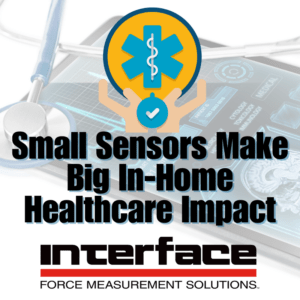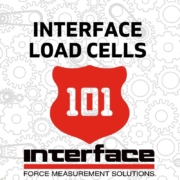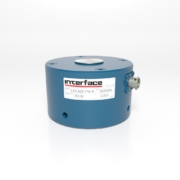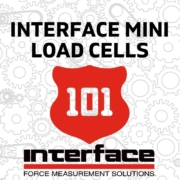Small Sensors Make Big In-Home Healthcare Impact
 In-home healthcare is booming, resulting in innovative medical devices that transform how we manage health outside the hospital. Driven by advancements in wearable tech, remote monitoring, and portable medical devices, a seismic shift empowers individuals to manage chronic conditions, recover from surgery, or maintain independence with greater ease and comfort.
In-home healthcare is booming, resulting in innovative medical devices that transform how we manage health outside the hospital. Driven by advancements in wearable tech, remote monitoring, and portable medical devices, a seismic shift empowers individuals to manage chronic conditions, recover from surgery, or maintain independence with greater ease and comfort.
Ensuring the safety and effectiveness of in-home healthcare equipment and devices is crucial, and that’s where miniaturized force measurement sensors play a role. In-home healthcare innovators and product makers use miniature load cells to demonstrate greater impact in improving home-based medical devices’ accuracy and relability.
Interface has a long history of providing the medical and healthcare industry with force measurement products for medical devices, pharmaceuticals, and in-home healthcare applications.
Interface Mini Load Cells are used for in-home healthcare device testing and integrated measurement solutions. The types of products include our popular models: Compression Load Button Load Cell, SSMF Fatigue Rated S-Type Load Cell, MB Miniature Beam Load Cell, WMC Sealed High Capacity Stainless Steel Miniature Load Cell, SMA Miniature S-Type Load Cell, and our new SuperSC S-Type Miniature Load Cell.
Why Are Interface Mini Load Cells Used for In-home Healthcare Devices?
#1 Size: Dimensions matter for these types of applications. Interface offers compact and versatile measurement devices that integrate seamlessly into existing and new medical devices, from monitors to therapy equipment.
#2 Capacity: The range of solutions needs to fit dimensionally, as well as by the capacity of the measurement. Whether it is minuscule Newton meters or several pounds of force, it is important to use a miniature load cell that fits the exact measurement requirements.
#3 Precision: High accuracy is paramount when developing and monitoring in-home healthcare devices. The sensors must deliver precise measurements critical for device efficacy and patient safety.
#4 Endurance: The durability and reliability are also at the core of devices used outside a medical facility. They must be built to withstand the demands of home use, ensuring long-lasting performance.
#5 Integration: Many medical device manufacturers use Interface solutions as part of the overall equipment, embedding our sensors in the device to provide real-time feedback and monitoring.
#6 Research and Development: Any approved medical device takes years to complete the final product, including the regulation and compliance. Interface Mini Load Cells are used by design houses and testing labs throughout the prototyping phases.
Examples of Load Cells Technologies Making a Big Impact
- Smart Scales: Track weight changes, monitor medication adherence, and detect early signs of health issues.
- Rehabilitation Equipment: Measure force and progress during physical therapy exercises, providing personalized feedback and improving outcomes. See: Treadmill Rehabilitation
- Transfer Lifts: Ensure safe and comfortable patient transfers by accurately measuring weight and balance. See: Patient Hoyer Lift
- Infusion Pumps: Precisely control medication delivery for chronic conditions, improving patient safety and treatment effectiveness. See:
- Bed Weighing: Monitor weight fluctuations for accurate diagnoses and treatment plans, even at home. See: Hospital Bed Weighing App Note
- Assistive devices for people with disabilities: The design must be tested with precision measurements to ensure they enhance functionality and independence.
The demand is high due to in-home medical devices. What was once viewed as for use in hospital settings is now in homes around the globe. By enabling patients to manage their health at home, these devices can improve outcomes through increased compliance, early intervention, and personalized care. Home healthcare can be significantly cheaper than hospital care, benefiting patients and healthcare systems.
Our team of measurement application engineers provides standard, custom, and OEM sensor solutions for in-home medical devices. Our experts assist you in finding the right load cell for your specific needs.
We have proven experience providing sensors for seamless integration into existing equipment or new medical device designs to ensure compatibility and optimal performance. Together, we can help leverage the power of miniature load cells to create a future of personalized, effective, and accessible in-home healthcare.
ADDITIONAL RESOURCES
New Technical White Paper Analyzes SuperSC S-Type Miniature Load Cells
Spotlighting Medical Device and Healthcare Solutions
Medical and Healthcare Solutions
Interface Solutions for Medical Devices and Healthcare
Measuring the Potential of IoT Wearables Using Load Cell Technology
Accuracy Matters for Weighing and Scales








